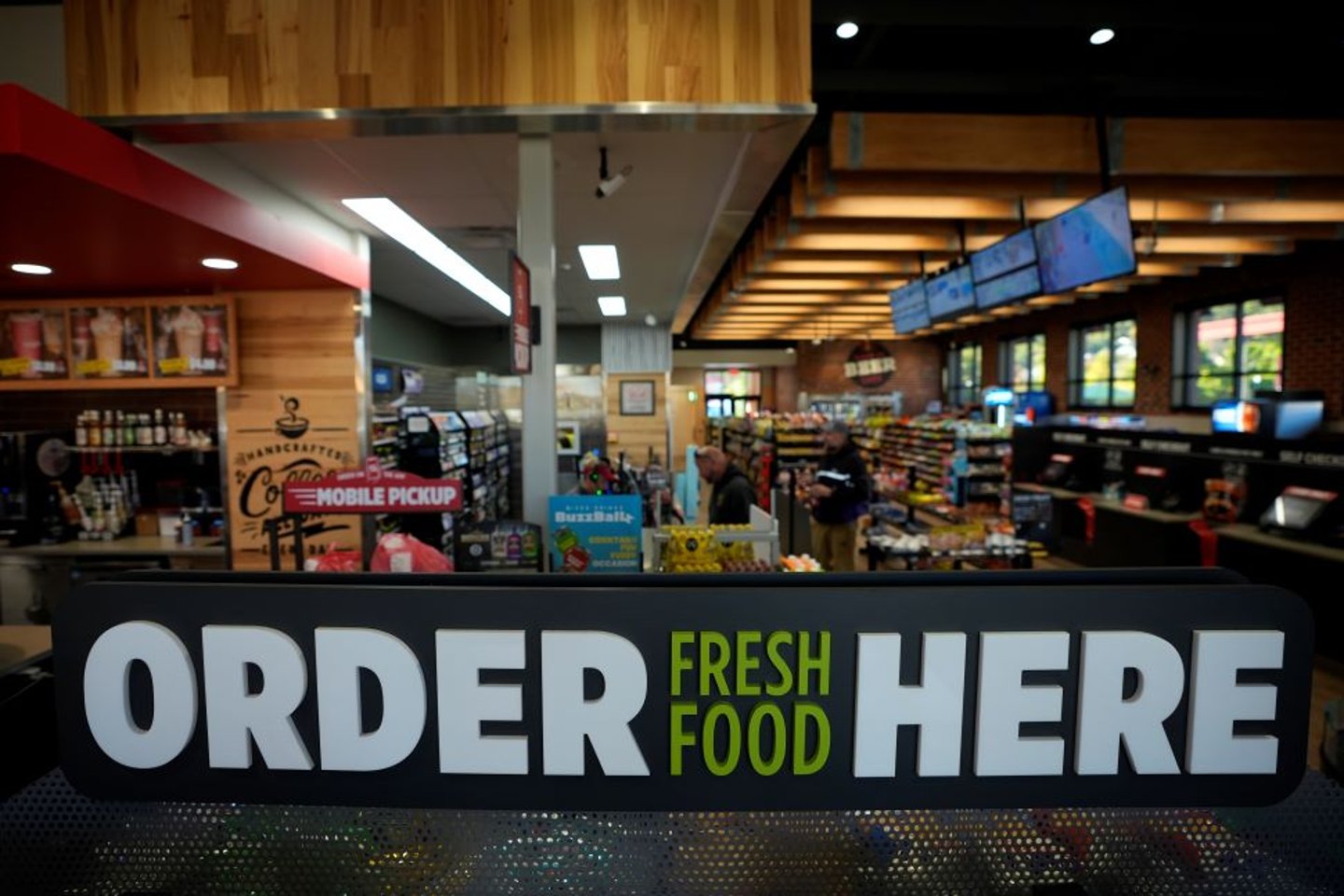Will U.S. convenience stores find the secret to selling better food?
Americans who think of petrified hot dogs, frozen burritos and salty snacks when they imagine getting food at a gas station or truck stop may be pleasantly surprised during their next road trip: U.S. convenience stores are offering them more and better — though not necessarily healthier — choices.
From 7-Eleven to regional chains like QuikTrip, the operators of c-stores, as they're known in the trade, are looking overseas for grab-and-go inspiration, adding sit-down seating at some locations, expanding their coffee menus to rival Starbucks and experimenting with made-to-order meals for busy families.
The moves are happening as convenience stores seek ways to offset slowing sales of cigarettes, maps and soft drinks. By tempting customers’ palates with fresh deli sandwiches and build-your-own burgers, the humble food marts want to become an alternative to fast-food restaurants for busy Americans who crave easy, interesting and less expensive eating options.
“It has been a decades-long journey to go from food that was perceived as desperation to destination,” Jeff Lenard, vice -president of strategic industry initiatives for the National Association of Convenience Stores, said.
Once known for breakfast and lunch, convenience chains like Wawa, with more than 1,000 East Coast locations, as well as small operators like York, Pennsylvania-based Rutter's, have moved into dinner time with soup, chicken and fish dishes. Rutter's, which operates 90 stores, plans a new store format with expanded seating as it adds 50 new locations in the next five years.
Casey’s General Stores, the nation's third-largest convenience store operator with 2,500 outlets mostly in the Midwest and the South, introduced warm chicken, pork and hamburger sandwiches on brioche-style buns this year. The company, already known for serving pizza that customers enjoy, created a limited-time menu that included pies and sliders made with smoked pulled pork, barbecue sauce and pickles.
“We really are approaching this like a restaurant as we always have, but more so now,” Carrie Stojack, the Iowa-based chain's vice president of brand and strategic insights, said. “Prices have gotten really high. So what’s happening is that convenience stores are becoming a real viable option for guests.”
In keeping with their quest, convenience stores are expanding delivery services to build on a customer base they found during the COVID-19 pandemic. 7-Eleven plans to take its 7Now delivery app nationwide, allowing users to have pizza, the chain's signature Slurpees and thousands of other items brought to their doors.
The nation's largest convenience store chain, owned by Japanese company Seven & i Holdings, offers select Japanese items like chicken teriyaki, rice balls, miso ramen and sweet chili crisp wings at some U.S. locations and at its recently acquired Speedway and Stripes stores. Visitors to Japan and Hawaii often respond with envy and astonishment when they taste what’s on offer at a 7-Eleven in Tokyo or Honolulu.
READ: Convenience stores gaining edge for shopper’s wallet: study
The chain's North American subsidiary said it works with some of the same food manufacturers and commissaries that serve Seven-Eleven Japan. That includes Warabeya, which is expanding its U.S operations to help deliver fresh food to stores and provide an assortment of offerings to suit regional tastes.
“Our team draws inspiration from around the world to introduce new items like mangonada donuts with Tajín, barbecue pork sliders, chicken curry bowls and everything breakfast sandwiches," the subsidiary said in a statement after declining interview requests.
Seven & i Holdings disclosed earlier this month plans to close 444 U.S. locations amid slowing sales, inflationary pressures and an accelerated decline in cigarette purchases. The company also is fielding a buyout offer from Alimentation Couche-Tard, the Canadian owner of the Circle K convenience stores.
Appealing convenience store food isn't entirely new and has varied widely by region. Buc-ee’s, the Texas-born chain with 50 stores in the South, has a cult following among fans who regularly stop for breakfast tacos and snacks like caramel-coat corn puffs called Beaver Nuggets.
Pennsylvania residents, meanwhile, happily debate the relative culinary merits of the food from Wawa (Try the Gobbler, a hot turkey sandwich with stuffing, gravy, and cranberry sauce, they advise), Sheetz (the expansive menu of hot and customizable food includes breakfast bagels and quesadillas) and Landhope Farms, beloved for its hand-dipped ice cream cones and milkshakes.
TikTok and YouTube videos of people eating nothing but convenience store food for a day or comparing the dishes from different chains have helped drive interest in food on the road.
Anderson Nguyen, 26, a TikTok content creator based in San Francisco, tried the chicken and macaroni and cheese from Krispy Krunchy Chicken, which operates most of its locations inside gas stations and convenience stores.
“I generally don’t buy too much stuff from these convenience stores,” Nguyen said. But he said his experience at Krispy Krunchy Chicken would make him reconsider.
The coronavirus created a unique role for the sector. Most restaurants closed temporarily at the height of the pandemic, while many convenience stores remained open.
Non-fuel sales at U.S. convenience stores increased 36% between pre-pandemic 2018 and last year, growing from US$242 billion to almost US$328 billion, according to a National Association of Convenience Stores analysis of sales data from roughly 20,000 locations. During the same period, cigarettes as a percentage of those sales fell from 31% to 20%.
In upping their food offerings, convenience stores now threaten to take business from fast-food chains like McDonald’s, Burger King and Wendy’s, which used summer deals to revive sales, experts said.
Jonathan Raduns, CEO of food merchandising at retail consultancy Merchandise Food LLC, did a spot check online of similar items offered at specific fast-food restaurants and convenience chains that showed convenience store food was actually cheaper.
For example, a large pepperoni pizza at a Casey's in London, Ohio, cost US$13.99 versus a similar version at a Domino's, which cost US$14.99. And a large coffee at convenience store chain Parker's Kitchen in Savannah, Georgia, sold for US$2.49 versus US$3.48 for similar size at a Starbucks in the same area.
Virginia-based convenience chain Arko, which operates stores under such banners as 1-Stop and ExpressStop, has focused on being an affordable alternative. At the beginning of the year, it rolled out what it described as an “inflation-busting” 12-inch pizza that cost US$4.99 for members of Arko's free loyalty program and US$7.99 for non-members.
“It took us months to come up with good quality and something people can actually afford,” Arko Corp. CEO Arie Kotler said.
Nutritionists and organizations like the American Heart Association encourage service station retailers to focus on fruit and other fresh food that's healthy.
Kristen Lorenz, a registered dietitian with a private practice in Grand Rapids, Michigan, said convenience food operators have been adding healthier options like lettuce wraps and yogurt parfaits. Previously, the prepared food consisted of meat on a roller and pizza that looked “dry and wrinkly."
Among Lorenz's favorites: customized sandwiches at Sheetz and Wawa.
“Everyone has to get gas and everyone has to eat,” she said. “So offering a variety of healthy choices that Americans can choose from is good. And what’s great about these stores is they still have the traditional items that can make a road trip fun. You could get a small bag of chips.”
___
AP Food Writer Dee-Ann Durbin in Detroit contributed to the report.



